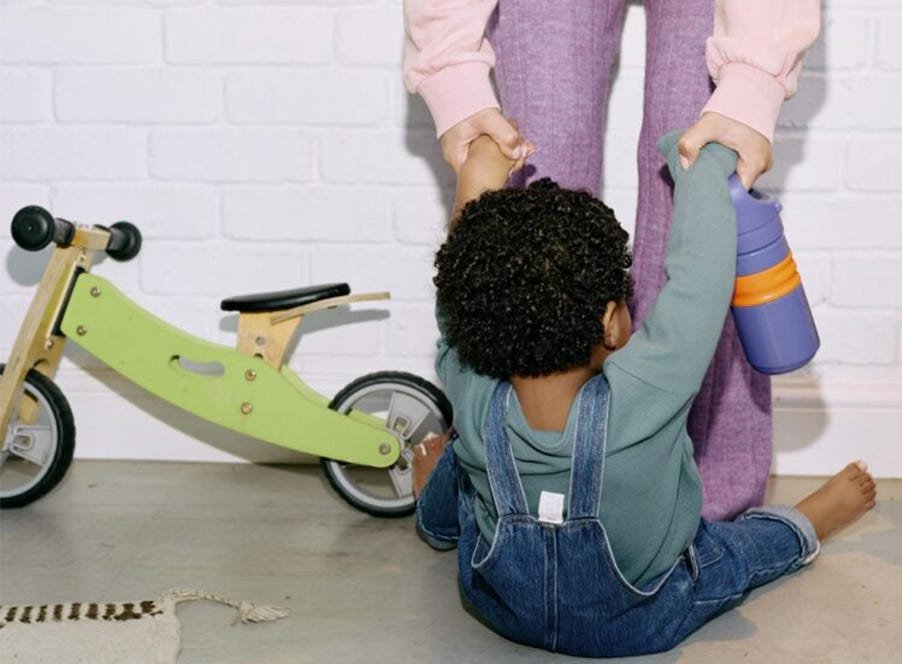
Ultimate XL Nappy Disposal Bundle with 18 Refills
Bundle & Save 40%
Subscription orders can be cancelled at anytime. Free delivery on all subsequent subscription orders. Find out more about subscriptions.
They’re easy and fuss free
Your products are automatically sent to you
You save up to 10% when you sign up for a subscription
You can cancel at any time

Temper tantrums are very common in toddlers and affect both girls and boys equally. They usually start when they reach 18 months of age and are outbursts that involve biting, hitting, and pushing, as well as crying, screaming and shouting.
At this age, little ones can become frustrated as they're not yet able to properly communicate, and this frustration is released as a temper tantrum.
Tantrums can understandably be difficult for parents to deal with but don't worry, they don't last forever! By the time children reach the age of four and can express how they're feeling, they become far less frequent.
To help you out, we've got some tips and tricks for parents on how to cope with their toddler's temper tantrums.
Unfortunately, tantrums are an inevitable part of raising a toddler, but there are a few techniques you can add to your tool kit to help you manage them.
When a tantrum begins, it can help for parents to put themselves in their child's shoes and try to understand why they're upset and how they're feeling. Perhaps they're tired or hungry or feeling frustrated or jealous. Try to go down to their level and ask them simple questions like "are you hungry?" or "are you tired?" in a firm but calming tone of voice to help calm them down.
Once you know the root cause of the tantrum, it's a good idea to acknowledge their feelings by saying "I know you're feeling tired...". This can help to teach them about the full spectrum of emotions that people can feel - like insecurity, anger, stress, worry, fear, or excitement - rather than just happiness or sadness. That way, they'll learn to talk to you about how they're feeling and become able to express their frustrations openly.
Toddlers' attention spans are short, and they usually forget what they're upset about relatively quickly. If you can, try to distract them with something exciting that you can see. You can also try switching up their surroundings by taking them outside or into another room to look at something new and different. You can hold their attention by sounding excited or surprised.
We all know that children have tantrums, so there's no need to get embarrassed by them. That said, lots of parents still do, especially if they happen in a public place.
It's easy to become panicked, angry, or distressed, but try to remember that all parents go through the tantrum phase and that you're not alone.
Remember that your little one needs you during a tantrum and they're not intentionally trying to upset or embarrass you, so don't raise your voice and trust that the tantrum will pass. If you stay calm and in control, your little one is more likely to calm down too.
The NSPCC states that an angry reaction can "lead to emotional and physical harm. And this is never OK". Children mirror how their parents act, which can affect their behaviour in the future. So try to take deep breaths and react calmly.
Most importantly, if you get any unwelcome looks from strangers, try to brush them off and ignore them.
Whatever tactic you choose, make sure you stick to it. If you've asked them to do something and they're not cooperating, offer to help them. Don't give in to what your toddler wants. Keep in mind that if you reward their tantrum with something they want, they're more likely to continue.
Whenever they do something good, remember to reward your child with praise and loving attention. You can let them know how proud you are of them so that they learn to associate good behaviour with positivity.
Giving your toddler some choice over small parts of their day - like which piece of fruit they have as a snack, whether they play with their toy cars or read a story, or which colour t-shirt they wear - will give them a sense of control and avoid unnecessary conflict. Remember to choose your battles, avoid saying "no" to everything, and know that it's okay to follow your little one's lead sometimes.
Sometimes tantrums can escalate, and you'll need to take your little one away from a situation or space for their safety. In these cases, enforcing a timeout in a safe space can help. Lots of parents find that giving one minute of timeout for every year of their child's age works well. So, a three-year old would have a three-minute timeout, for example.
When choosing a dedicated timeout spot at home, it's a good idea to pick somewhere uninteresting where your child can sit, as this will help them calm down faster. If they get up and try to wander away, just take them back to their dedicated timeout spot without talking to them.
Once their timeout is over, they will hopefully have calmed down and you can repeat the reason for their timeout. That way, they understand, have a cuddle, and then continue with the day as planned.
If you're out in public and a tantrum escalates or becomes dangerous, hold them firmly but gently, explain that they're putting themselves in danger and reiterate your rules until they calm down.
Being a parent is tiring, so you need to take time for yourself and remember to de-stress and unwind from time to time.
It can also help to talk to other parents and share experiences to reassure yourself that you're not alone, and even though tantrums are hard, you're doing a great job!
As with all aspects of bringing up a child, all tantrums are different, so it's important not to compare your child to others. Remember to trust that you know your toddler best and you have the unique ability to help them adopt positive behaviour by setting clear rules and creating healthy boundaries.
For most children, temper tantrums are a normal part of being a toddler. However, if they hurt themselves or others, hold their breath to the point of fainting, or continue to have worsening tantrums beyond the age of four, you should voice your concerns to your doctor and ask for their advice and support.